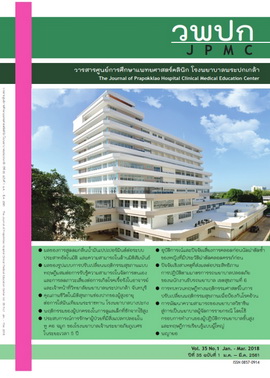การพัฒนาความสามารถของพยาบาลวิชาชีพสู่การเป็นพยาบาลผู้จัดการรายกรณีโดยใช้กรอบการทำงานของผู้ปฏิบัติการพยาบาลขั้นสูงและทฤษฎีการเรียนรู้แบบผู้ใหญ่
Main Article Content
Abstract
The article discusses the development of professional nurses' competence for each nursing specialty area. In the development of nursing care for specialized competence, advanced practitioner is a value proposition for the health system. Nursing is an essential principle of the health service system. However, the contextual constraints of each nursing facility may be due to the lack of nursing staff which makes it impossible to deliver professional nurses for short-term training and long-term maintenance. To have a skilled nurse, The Advanced Practitioner Framework (PEPPA) has become widely recognized by both domestic and international advanced practitioners. Based on a clear procedure which is used as a guideline or a model for professional nurses to develop or enhance their abilities to become a case manager, and to develop a caring system in case of nursing shortage which will eventually lead to better quality results. However, there is a downside to this outcome, that the developed group of nurses will have extra work to do, so they will be overloaded with task, which as a consequence will affect their self-development. Adult Learning Theory by Knowles, Holton & Swanson (2005) enables professional nurses to enter into the competence development process by valuing and recognizing the need for a case manager. This learning theory, combined with nurse’s working experience as well as their self-motivation, can make these nurses become successful in their careers and gain more confidence in this case manager field. Therefore, these nurses need to be provided with higher education as master level and pass an exam to be able to qualify as “Advanced Practioners Nurses”, or those nurses who have advanced diploma in nursing, to go through exams to be fully qualified as well.
Keywords: professional nurses' competence; nurse case managers; framework of advanced nurse practitioners; adult learning theory

